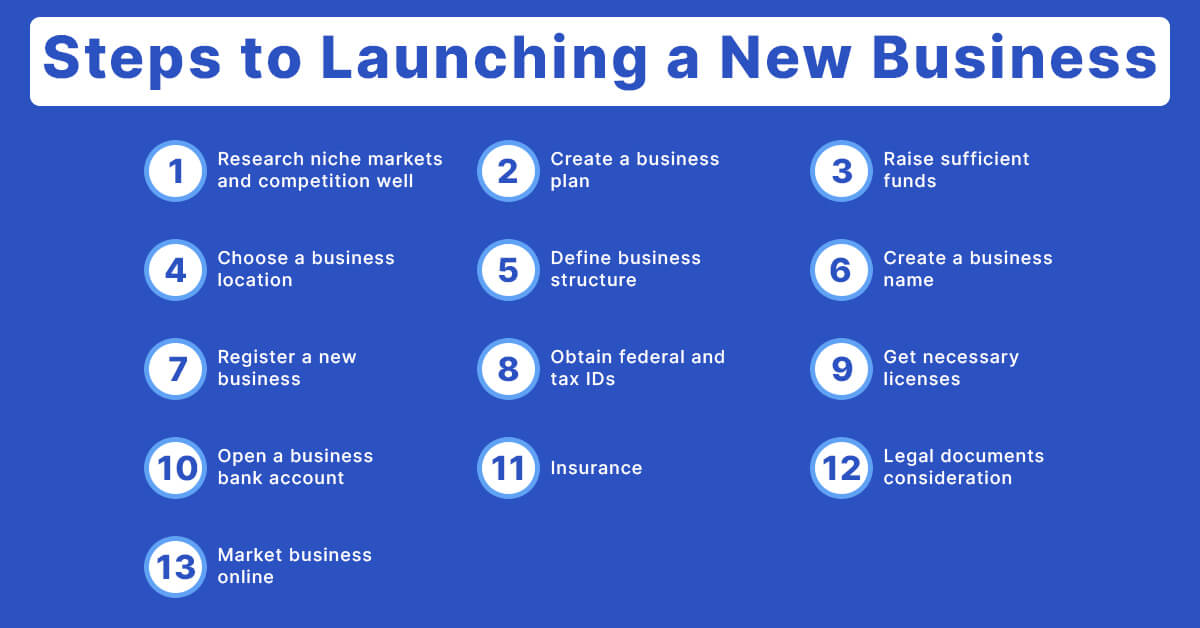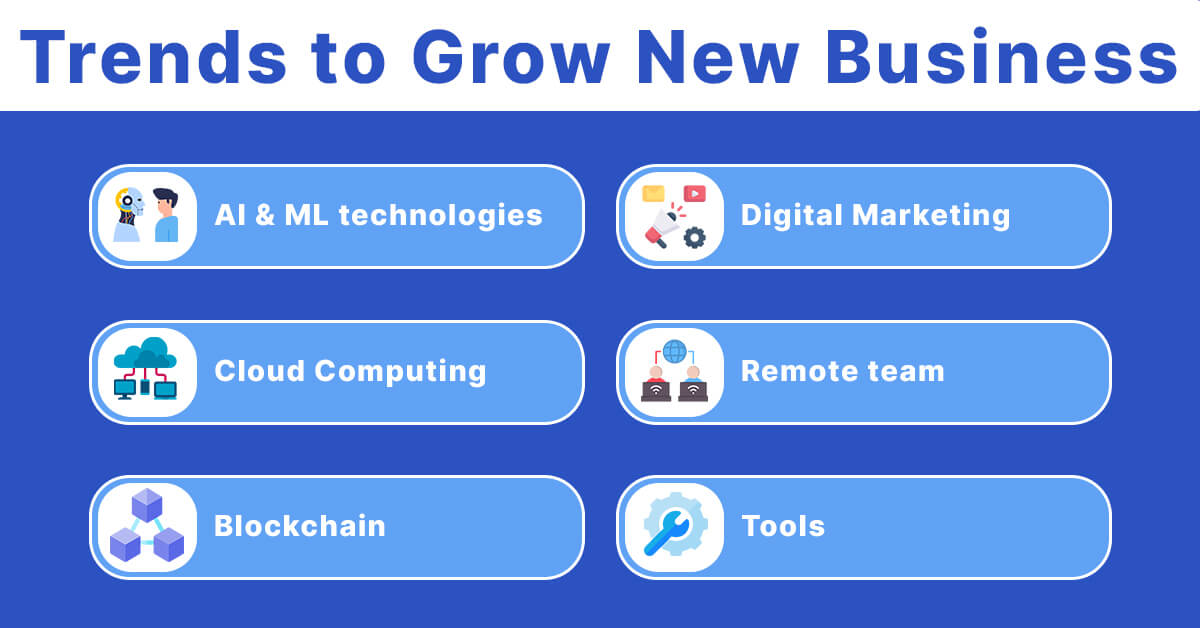
Launching a new business is a huge undertaking, but at the same time, it’s rewarding and exciting as you will be your boss. Being a boss comes with a lot of responsibilities and considerations. But where to start and how to start a new venture from scratch is a tricky question for budding entrepreneurs.
Additionally, the million-dollar business idea brings the expected level of success when it’s executed rightly with data-backed decisions. To help entrepreneurs start a business strategically, the How to Start a Business guide will teach them all the necessary considerations and processes of setting up a new business successfully, followed by top trends that ensure new startup entrepreneurs stay relevant and stand out in the crowd.
Table of Contents
- Things to Consider During New Business Launch Planning
- Step-By-Step Process to Launch a New Business
- Research niche markets and competition well
- Create a business plan
- Raise sufficient funds
- Choose a business location
- Define business structure
- Create a business name
- Register a new business
- Obtain federal and tax IDs
- Get necessary licenses
- Open a business bank account
- Insurance
- Legal documents consideration
- Market business online
- Top Trends That Can Help a New Business Grow Boundlessly
- Thrive Your Newly Launched Business in the Changing Landscape
Things to Consider During New Business Launch Planning
The success of a newly launched business relies on several factors that entrepreneurs cannot afford to ignore. These factors are based on strategic business planning by revealing what to do, why to do, and how to do different things. To do that these considerations are crucial;
- Check business idea feasibility
- Know your target audience
- Assess the business idea’s potential
- Analyze the competition
- Create USP
- Consider economic factors
- Build a strong network
- Arrange funds for new business
Step-By-Step Process to Launch a New Business
Every million-dollar business that gained immense success overnight appears great to everyone. However, the ugly reality remains behind the scenes. The years of sweat and planning, when executed sequentially, position the business to the top. Here’s the roadmap for how to start your own business that will make a great headline later on.
Research niche markets and competition well
Business product idea validation goes in line with market and competition research because the target audience and investors want to know what sets your business apart in the crowded market. Thorough market research reveals what potential customers expect from your future business and allows creating products accordingly and make marketing decisions effectively.
The best source of knowing competition is customers who can be interviewed, surveyed, and asked for questionnaires to get detailed data. Later, organizing and analyzing the data distinctively helps gain rich insights about the market and competition. SWOT analysis is also a good approach to knowing weaknesses that can be improved, opportunities to avail of, and threats to avoid proactively. The competition analysis will help you determine what should you do to make your idea successful and achieve ROI in a short time.
Create a business plan
Data gained from market research and competition analysis is well-structured in the business plan. A business plan acts as a roadmap for the business itself or potential investors, showcasing a brief of the business with goals and methods to achieve the same. It also includes a company description that covers a range of issues that a business product or service will solve.
The market analysis report is displayed that highlights where the business will position against the competition after its launch, followed by the expected growth rate and market size. The mission statement and measurable and realistic goals are determined in the business plan. The marketing plan and financial plan are the cardinal aspects of the business plan that ensure the business will propel forward without losses.
Raise sufficient funds
Not all businesses are launched with minimum investment. Most businesses require a good amount of money that depends on various factors: buying or renting space, carrying inventory, hiring staff, and product marketing. That’s why calculating start-up business costs and break-even analysis are important to stay profitable. To cover initial business expenses and maintain cash flow, raising enough funds is essential.
Businesses can self-fund, which gives complete control over their business. In the case that businesses don’t have funds, raising capital from investors in exchange for an ownership share is a good option. Crowdfunding also considers that it doesn’t require any share in the ownership of businesses and not even a financial return on investment.
Grants are popular for businesses that encourage innovation and are provided by the federal government or local and regional organizations. Business loans are an age-old approach to funding businesses according to the guidelines of the banks, but it takes a lot of time and effort to get capital.
Choose a business location
Whether you are launching an online business or setting up a new brick-and-mortar store, selecting a business location is an important consideration as it influences legal requirements, taxes, zone laws, and others. The business location depends on the location of the target audience and partners. Also, the location of government agencies is worth considering as it impacts the benefits and restrictions adhered to by them.
Region-specific business expenses are influenced by business location, so the business location is chosen after checking property rates, minimum wage laws, insurance rates, and more. Don’t forget to check out local zoning ordinances, as they restrict certain types of businesses operating in a particular area. Identify the incentive programs and benefits provided by local government so that businesses can avail of the location selection.
Define business structure
Business registration requirements are based on the legal structure selected for the business. Every business structure defines personal liability and taxes to pay. Mostly, 4 types of business structures, such as LLC, LLP, Sole proprietorship, and Corporation, are popular worldwide.
LLC is owned by a group of people or business entities along with a registered agent. The structure provides liability protection for owners and restricts liability for business debts. It can be started with one person and is easy to set up as well.
Licensed business professionals leverage LLP with partnership agreements. Endless professionals can be partners in LLP with the least liability in debts. Less paperwork makes it easy to form an LLP.
Entrepreneurs looking to start a new business can opt for a solo proprietorship, where they are responsible for business liability. Complete control over business comes with complete financial responsibility for business debts.
Corporation is a go-to option for businesses looking to minimize their liability for business debt. Corporations comprise S-corporations and C-corporations that are selected based on how the business opts to raise the capital.
With so many options, it’s better to connect with an attorney or business accountant for business structure selection for your business, as various tax treatments influence business ROI.
Create a business name
Entrepreneurs dream of keeping a unique name that reflects the brand and its mission. The business name must be a blend of creativity and market research alongside ensuring it’s not been used anywhere else before. It’s good to keep the same domain name as a business name when you are looking for digital transformation to establish an online presence in the future. Check out if the selected name is the same as another registered business name or trademark, or else it falls into legal jurisdiction unnecessarily.
With entity name registration, the business gets protected at the regional level, and trademark registration makes the business safe from legal actions at a federal level. When a business opts to operate with a fictitious business name that’s also known as ‘doing business as,’ then file DBA with state or city government offices.
Register a new business
Making a business a legal entity requires business registration first, which starts with form filling and paying a filing fee. Business registration is as easy as business name registration and helps get legal and tax benefits. Businesses can register with federal agencies or state agencies by connecting with a registered agent of the same state. The register will handle legal documents and official papers required for registration, freeing up businesses from paper tasks.
In the event a business is registered in one state and conducts business activities in other states, filing for foreign qualification is important, which informs the state that your business is active there as well. Later, all the documents and fees are paid depending on the business structure and state. When the state provides a certificate, businesses can leverage it to apply for bank accounts, licenses, and TINs.
Obtain federal and tax IDs
Federal employer identification number is important for businesses other than sole proprietorships, which requires businesses to submit the application for the same to the IRS. Employer Identification Numbers (EINs) are essentially federal and tax IDs that act like business security numbers. Right after business registration, businesses apply for federal tax ID for free. Businesses can also opt for changing or replacing federal tax IDs when business structure changes.
A state tax ID number is necessary for businesses to pay state tax seamlessly. However, tax obligations vary at state and local levels, so businesses should research and analyze state laws regarding income tax and employment tax. Remember, not all states demand income tax, so you should check the state’s website to find out if you really need to get a tax ID number.
Get necessary licenses
Most businesses require state and local licenses to work in specific regions, so it must be checked earlier. The requirements for licenses and permits for businesses change according to business activities listed by federal and state agencies.
The licenses and permits required at the state and local level depend on business location and business activities, which ultimately drive changes in license fees. Also, the licenses are expired after a certain time and need to be renewed. The license renewal process is quite easier as compared to applying for a new license. However, local government offices help businesses get customized information regarding business license needs.
Open a business bank account
Creating a business bank account is a good way to keep personal transactions separate. Opening a business account enables money transactions for businesses while staying legally protected and compliant. It offers a range of benefits that a standard bank account cannot provide, such as limited liability protection, a sense of professionalism, increased purchase power, and more.
Businesses should research before opening a business bank account so that they will get a merchant service bank account that facilitates services at lower transaction rates, AVS fees, ACH daily batch fees, and monthly fees. Checking introductory offers, interest rates, and other types of fees is good. To reap these benefits, businesses should have EIN, ownership agreements, business licenses, and formation documents.
Insurance
Unfortunate accidents, lawsuits, or natural disaster causes potential losses to the businesses, which are recovered with business insurance. Businesses must protect business liabilities by choosing the right insurance policy based on the business structure. Also, some states require businesses to buy insurance plans legally. For example, federal agencies require businesses with employees to buy unemployment, worker’s compensation, and disability insurance policies to ensure employees remain safe.
Seeking the advice of an insurance agent is good to know which type and number of insurance plans your business needs. Mainly, businesses opt for general insurance policy, product liability insurance, professional liability insurance, commercial property insurance, home-based business insurance, and business owner’s insurance policy.
Also, businesses can identify and buy the right insurance plan after assessing the business risk, finding a reliable insurance company, comparing prices, and then buying the plan.
Legal documents consideration
Businesses, when operating, often demand legal documents to verify the product is up to the mark or check nothing is going illegal. It varies from getting business licenses and permits from federal and state governments to non-disclosure agreements ensuring customers’ data is safe.
Additionally, a business plan is documented to guarantee everything works as expected, and trademarks and business names are registered to differentiate the business legally and meet tax obligations with everything specified in documents. This way, legal documents ensure smooth business functioning with no legal issues.
Market business online
Business launches without marketing efforts won’t bring the expected results. So, investing time, effort, and resources into business marketing cannot be an afterthought for new businesses. Businesses should start marketing with online presence creation through website development. The growing internet penetration has made it essential for businesses to inform customers online about their offerings.
In addition to website development, optimizing a website for search engines with the right keyword selection ensures the website ranks higher and is visible to the customers. Building a social media marketing strategy is also a good way to harness social power and increase traffic. Listing businesses in the online directory is a good approach to improving the local search of the business.
Lending a hand of free business apps also helps small business owners to market services, handle operations, manage finances, and enhance customer support inexpensively.
Top Trends That Can Help a New Business Grow Boundlessly
New business launches with limited products cannot ignore technology embrace because technology use cases have become part and parcel of users’ lives. Adopting technological trends helps businesses grow boundlessly. Here are some of the trending ones.
AI and ML technologies
AI and ML technologies powered chatbots are revolutionizing businesses with guided assistance in everything from production lines to customer support.
Cloud Computing
Cloud computing has taken data management, backup, data recovery, and data sharing to the next level. Easier and more secure access, management, and modification improve collaboration in the business workspace.
Blockchain
Blockchain emerged as the most secure technology that facilitates transparent and decentralized storage of documents.
Digital Marketing
Growing usage of hand-held digital devices led businesses to be available where the users are. Digital marketing is a cost-effective approach to making business offerings available where users are looking for them.
Remote team
The remote team concept is growing presently with evolving communication channels so that teams can work on the projects virtually.
Hiring Remote Developers at Offshore IT Company – A Comprehensive Guide
Tools
A range of software tools such as CRM, ERP, designing tools, accounting tools, and marketing tools allows businesses to manage and function effortlessly.
Thrive Your Newly Launched Business in the Changing Landscape
You are pouring hard-earned money, valuable time, and a lot of effort into shaping your dream business into a reality. Getting enormous success counts on how you plan and launch your business following a couple of tips and tricks. Follow the roadmap of strategic business launch and embrace advanced technological trends to tap the full potential of your new business. When unsure about anything related to business post-launch, connect with the best business service company that helps you with improving operations, performance, and financial gains with their experience and expertise. Experiment with technologies, engage your audience and enjoy unprecedented growth continuously.
 Derek Cohen
| Mar 29, 2024
Derek Cohen
| Mar 29, 2024
Analyzing business activities and data to formulate the best business development ideas is where I earn appreciations and remunerations. I’m an ardent reader, business adviser, gadget aficionado and an amateur yet an avid writer. My urge for innovative writing evokes every time I come across new gadgets, neo technology and novel technical events.




